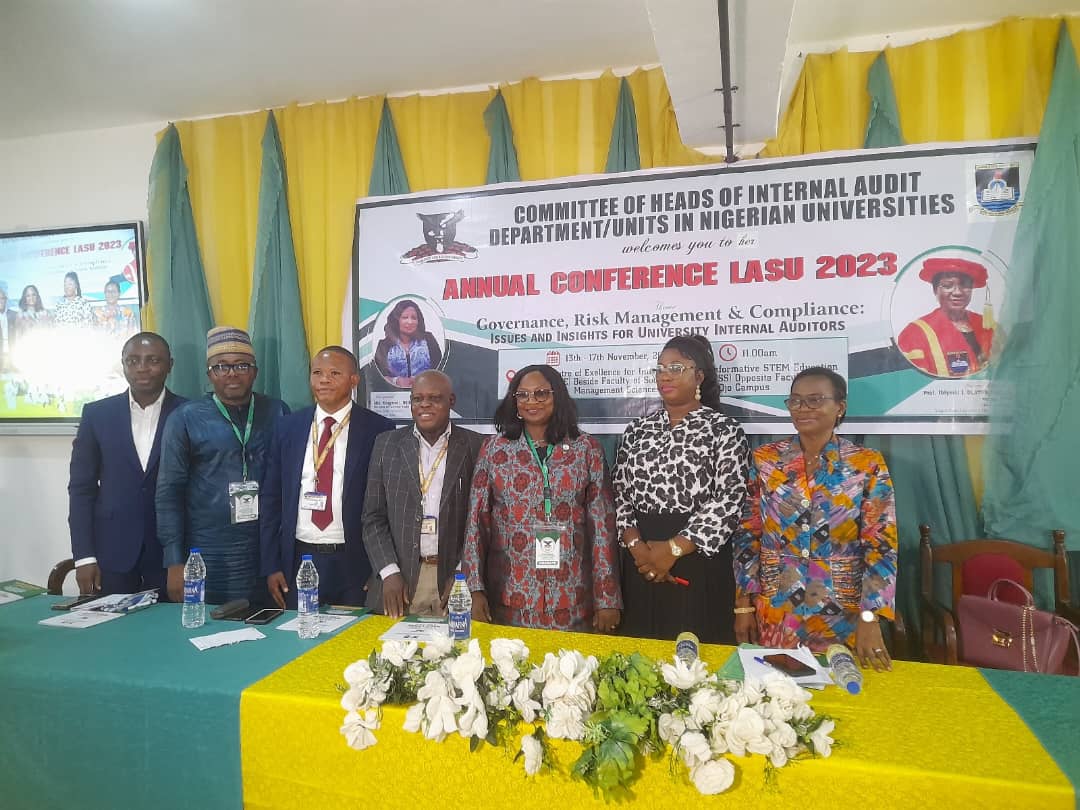The heads of internal audits in Nigerian universities have been charged to embrace principles of good governance, accountability and transparency to improve their respective institutions.
The Auditor-General of Lagos State, Mr Moshood Adewuyi, gave this advice on Tuesday at the 36th National Conference and Annual General Meeting of the Committee of Head of Internal Audits Departments/Units In Nigerian Universities, held at the Lagos State University, Lagos.
The theme of the conference is “Governance, Risk Management and Compliance: Issues and Insights For University Internal Auditors”.
Adewuyi, who was represented by Head, Internal Audit, Lagos State Urban Renewal Agency, Olufunmilola Coker, stated that the role of internal auditors cannot be overemphasised in any private or public organisation, noting, “they are indispensable in ensuring compliance with extant financial rules and regulations.”
Adewuyi said this compliance allows the internalisation of processes and procedures in the application of resources.
“The role of auditors put them as ‘watchdogs or gatekeepers’ because they ensure proper documentation, examination of books and records, monitoring the use of resources by pre-determined financial plans, and safety of organisational assets.
“Our roles are essential to the growth and development of the respective universities where we work, and especially in situations where resources are limited and where value for money is expected,” he added.
According to him, auditors must embrace effective organisational risk management and mechanisms established to ensure adherence.
In her address, the Vice-Chancellor of LASU, Prof. Ibiyemi Olatunji-Bello, urged the internal auditors to leverage their expertise and devise strategies for better resource management of their various institutions.
Ibiyemi-Bello, represented by the Deputy Vice-Chancellor, Academic, LASU, Prof. Funsho Omobintan, said varsity managers need all the resources to overcome the economic uncertainties that had put unbearable strains on their lean resources.
“Faced with dwindling income and high running costs, universities cannot but be prudent by ensuring that every kobo earmarked for projects brings the highest benefit to the university,” she said.
According to her, LASU auditors led by Mrs Margaret Ogunkoya, Director, Internal Audit and National Chairman, CHIADINU are regarded as an indispensable stabilising force in the management of the university’s finances, especially during the period of economic challenges.
The varsity VC said “Our auditors ensure that the university’s financial systems meet the highest ethical standards with the management and indeed members of staff.
“This is tasked with compliance with the highest ethical standards, probity and accountability in their financial dealings and other related matters of the university.
“I give kudos to the LASU Directorate of Internal Audit for bringing this year’s CHIADINU’s annual conference to LASU, which aligns with the university’s vision of developing well-trained personnel for the administration of the institution
Mrs Oluwatoyin Adegbuji-Onikoyi, Chairman, Lagos State Audit Service Commission, also charged the internal auditors not to be weak in their duties, as their weaknesses imply weakness and failure in the system.
Adegbuji-Onikoyi stated that good governance and auditing have a close relationship, as any system without checks and balances cannot stand.
“The watchdog of auditors is fairness and firmness, and they must work to promote transparency and integrity in an organisation because the public is relying on them for trust,” she said.
In her welcome address, Ogunkoya said that the CHIADINU annual conference is a testament to the auditors’ commitment to excellence, knowledge sharing and the pursuit of a better future for the Internal Audit Department and Units in Nigerian universities.
Ogunkoya noted that the theme of the conference could not be more relevant.
She explained that Governance, Compliance and Risk management is a framework that enables institutions to align their strategies, objectives and operations with regulatory requirements.
“GCR encompasses a wide range of activities, including risk management, regulatory compliance, corporate governance and information security management.
“Effective GCR practices can help organisations to build trust with stakeholders, enhance reputation and improve overall business performance.
“A well-planned GRC strategy with an integrated approach goes a long way in helping institutions manage risk and maintain integrity,” she said.
In a plenary session, Mr Olanrewaju Sharafa, a Nigerian UK-based Chartered Accountant, provided eight steps that the auditors can deploy to get grips with the DNA of their institutions.
Olanrewaju told the auditors to make a case for auditing culture and gain the support of their board and audit committee.
He also advised them to pinpoint exactly what they want to assess, take a risk-based approach, be strategic about resourcing, tailor their approach to the organisation and be flexible when writing their reports.
No fewer than 120 universities’ Heads of Internal Audit Department/Units across the country participated in the conference.



